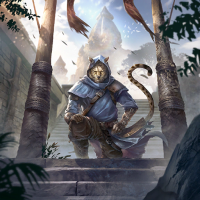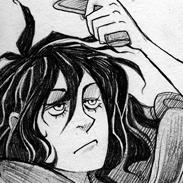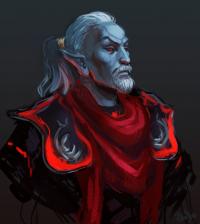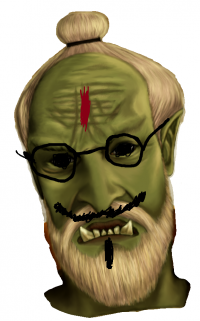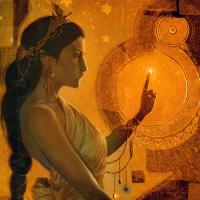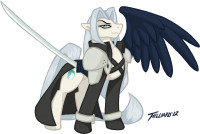January 27, 2016 12:10 AM EST
There is an interview with the lead lore writer, Lawrence Schick in which the Orc Wife issue is discussed, as is the gender role in Orsimer society. Definitely worth a read:
you get a little bit behind the scenes you actually see his wife - his wives plural - and his mother running the show. Is that something which is typical for orcs?
Lawrence Schick: Yes, it is typical for orcs. Now, it does vary from clan to clan, but orcish society is on the face of it apparently a patriarchy because you’ve got these big, bossy orcs, at the top are the warchiefs and the kings telling everybody what to do and, “go here and, you know, bring me my turkey leg, I’m hungry!” And it looks like they’re in charge but really it’s the Forge-Wives, the Shield-Wives, the Hearth-Wives, the Hunt-Wives who are married to this guy, are associated with the bosses, they actually are the ones who run everything. They’re in charge of all the administrative details of the clan, or at Kurog’s level, the kingdom. And really he’s endorsing their decisions and taking the credit for it but really they’re in charge, and so it’s an apparent patriarchy. But really there are very strong positions for both genders throughout the different orcish societies and strongholds and cultures and, you know, it’s way different than other places in Tamriel but it works for the orcs.
Kai: It does and now we have to argue who is smarter, is it the guy who is letting the ladies do all the work or the ladies who let him think he’s in charge while they…
Lawrence Schick: I’m not going there.
Kai: Ok, let's not go there.
Gina: ....you wanna take a question break? Elloa was asking what happens to his wives when
Lawrence Schick: So the question is what happens to the wives when the chief or the king…
Gina: I guess when the chief dies, yeah.
Lawrence Schick: Well you know, there are - like I said, they are the experienced administrators, they are the ones that are running things - they're often gonna have a hand in figuring out who their going to - who's going to be the successor because it's not necessarily all about who wields the heaviest bludgeon. It's, you know, it’s politics like with every mortal race, and so the widows of the dead clan chief or king, if they're any good at what they have been doing, they have built up their own constituencies and they're gonna find a solid place for themselves in whatever administration comes next, maybe even heavily involved in determining who that's going to be, who the leader’s gonna be.
As for the Hagravens, ESO has expanded on them magnificently, albeit with great bias in the in-game books. The impression I get from ESO backs this up, though in fairness I can't say Reachmen lore is of any great interest to me. Below is from a LMA, On the Nature of Reachmen
“The hagravens are abominations. Their eyes are flat and dead, and they live only for injury and domination. The Reach clans do not revere them so much as placate them, and they are hated even by their hag-husbands. Where do they come from? They come from our worst nightmares."
The accompanying book, A Life Barbaric and Brutal, has this:
Voanche's clan was ruled by a hagraven named Kloavdra, a claw-fingered crone who was a witch-shaman of considerable power. She was a priestess of Namira the Spirit Daedra, the lady of ancient darkness who commands repulsive vermin such as spiders, insects, slugs, and serpents.

